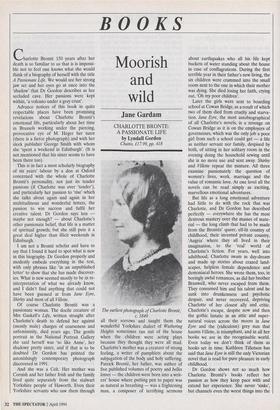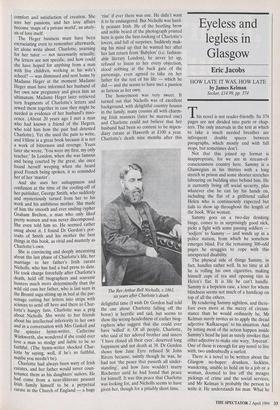BOOKS
Moorish and wild
Jane Gardam
CHARLO1 1E BRONTE: A PASSIONATE LIFE by Lynda11 Gordon Chatto, £17.99, pp. 418 Charlotte Brontë 150 years after her death is so familiar to us that is is impossi- ble not to feel one knows what she would think of a biography of herself with the title A Passionate Life. We would see her strong jaw set and her eyes go at once into the `shadow' that Dr Gordon describes as her secluded cave. Her passions were kept within, `a volcano under a grey crust'.
Advance notices of this book in quite respectable places have been promising revelations about Charlotte Brontes emotional life, particularly about her time in Brussels working under the piercing, provocative eye of M. Heger her tutor (there is a fierce photograph) and with her sleek publisher George Smith with whom she 'spent a weekend in Edinburgh'. (It is not mentioned that his sister seems to have been there too).
This is in fact a most scholarly biography of six years' labour by a don at Oxford concerned with the whole of Charlotte Brontd's personality, not just its tender passions (if Charlotte was ever 'tender'), and particularly her passion to 'rise' which she talks about again and again in her multitudinous and wonderful letters, the passion to win success and fulfil her creative talent. Dr Gordon says less — maybe not enough? — about Charlotte's other passionate belief, that life is a matter of spiritual growth; but she still puts it a great deal higher than illicit weekends in Edinburgh.
I am not a Bronta scholar and have to say that I found it hard to spot what is new in this biography. Dr Gordon properly and modestly embeds everything in the text, with only phrases like 'in an unpublished letter' to show that she has made discover- ies. What is new seemed mostly to be in re- interpretation of what we already know, and I didn't find anything that could not have been guessed at from Jane Eyre, Shirley and most of all Villette.
Of course Charlotte Brontë was a passionate woman. The docile creature of Mrs Gaskell's Life, written straight after Charlotte's death to defend her against (mostly male) charges of coarseness and unfemininity, died years ago. The gentle portrait in the National Portrait Gallery she said herself was `so like Anne', her shadowy pretty sister, and if that is to be doubted Dr Gordon has printed the astonishingly contemporary photograph discovered in 1991.
And she was a Celt. Her mother was Cornish and her father Irish and the family lived quite separately from the stalwart Yorkshire people of Haworth. Even their Yorkshire servants who saw them through The earliest photograph of Charlotte Bronte, c. 1849
all their sorrows and taught them the wonderful Yorkshire dialect of Wuthering Heights sometimes ran out of the house when the children were acting plays because they thought they were all mad. Charlotte's mother was a creature of strong feeling, a writer of pamphlets about the subjugation of the body and holy suffering. Patrick Brontë, her father, was author of five published volumes of poetry and belles lettres — the children were born into a writ- ers' house where putting pen to paper was as natural as breathing — was a frightening man, a composer of terrifying sermons about earthquakes who all his life kept buckets of water standing about the house in case of conflagrations. During the first terrible year in their father's new living, the six children were crammed into the small room next to the one in which their mother was dying. She died losing her faith, crying out, 'Oh my poor children'.
Later the girls were sent to boarding school at Cowan Bridge, as a result of which two of them died from cruelty and starva- tion. Jane Eyre, the most autobiographical of all Charlotte's novels, is a revenge on Cowan Bridge as it is on the employers of governesses, which was the only job a poor girl from such a school could get — a life as neither servant nor family, despised by both, of sitting in her solitary room in the evening doing the household sewing until she is no more use and sent away. Shirley and Villette repeat the mixture. All three examine passionately the question of women's lives, work, marriage and the value of romantic love. At one level all the novels can be read simply as exciting, marvellous emotional adventures.
But life as a long emotional adventure had little to do with the rock that was Charlotte, and Dr Gordon has described perfectly — everywhere she has the most dextrous mastery over the masses of mate- rial — the long climb that had to be made from the Brontds' queer, elf-lit country of childhood, their invented private country, 'Angria' where they all lived in their imagination, to the 'real' world of Charlotte's fiction. For years, well into adulthood, Charlotte swam in day-dream and made up stories about crazed land- scapes, helpless female dependence and demoniacal heroes. She wrote them, too, in boringly awful romances, as did her brother Branwell, who never escaped from them. They consumed him and his talent and he sank into drunkenness and psychotic despair, and never recovered, depriving Charlotte of her closest ally and critic. Charlotte's escape, despite now and then the gothic lunatic in an attic and super- natural voices across the moors in Jane Eyre and the (ridiculous) grey nun that haunts Villette, is triumphant, and in all her books we are in the recognisable world. Even today we don't think of them as books set in time. Kathleen Tillotson has said that Jane Eyre is still the only Victorian novel that is read for pure pleasure in early childhood.
Dr Gordon shows not so much how Charlotte Bronte's books reflect her passion as how they keep pace with and extend her experience. She never `sinks', but channels even the worst things into the comfort and satisfaction of creation. She uses her passions, and her love affairs become 'maps of a private world', an analy- sis of love itself.
The Heger business must have been excruciating even to remember afterwards, let alone write about. Charlotte, yearning for her tutor — not necessarily sexually; the letters are not specific, and how could she have hoped for anything from a man with five children, working in his wife's school? — was dismissed and sent home by Madame Heger at the moment Madame Heger must have informed her husband of her own new pregnancy and given him an ultimatum. Madame Heger later retrieved torn fragments of Charlotte's letters and sewed them together in case they might be needed in evidence of her husband's inno- cence. (About 20 years ago I met a man who had known a friend of the Hegers, who told him how the pair had detested Charlotte). Yet she used the pain to write, and Villette is a great book because it is not a work of bitterness and revenge. Years later she wrote, 'You were my first, my only teacher.' In London, when she was famous and being courted by the great, she once found herself weeping when she heard good French being spoken, it so reminded her of her 'master'.
And she uses her unhappiness and confusion at the time of the cooling-off of her publisher, George Smith, who suddenly and mysteriously turned from her to his work and his ambitious mother. She made of him the smooth and ever smiling cypher Graham Brelton, a man who only liked pretty women and was never discomposed. She even told him so. He seemed rather smug about it. I found Dr Gordon's por- traits of Smith and his mother the best things in this book, as vivid and masterly as Charlotte's own.
She is convincing and deeply interesting about the last phase of Charlotte's life, her marriage to her father's Irish curate Nicholls, who has had a bad press to date. He took charge forcefully after Charlotte's death, held off biographers and souvenir hunters much more determinedly than the wild old cuss her father, who is last seen in the Brontë saga sitting up in bed at the par- sonage cutting her letters into strips with scissors to send off here and there to Char- lotte's hungry fans. Charlotte was a prig about Nicholls. She wrote to her friends about his intellectual inferiority to her own and in a conversation with Mrs Gaskell and the spinster hymn-writer, Catherine Winkworth, she wondered if she could ever love a man so stodgy and liable to be so faithful. (The hymn-writer shocked Char- lotte by saying, well, if he's so faithful, maybe you needn't be).
Charlotte had always been wary of Irish curates, and her father would never coun- tenance them as his daughters' suitors. He had come from a near-illiterate peasant Irish family himself to be a perpetual curate in the Church of England — a huge 'rise' if ever there was one. He didn't want it to be endangered. But Nicholls was hard- ly peasant Irish. He of the beetling brow and noble beard of the photograph printed here is quite the best-looking of Charlotte's lovers, and full of surprises. Suddenly mak- ing his mind up that he wanted her after her last return from 'Babylon' (i.e. fashion- able literary London), he never let up, refused to listen to her every objection, stood sobbing at the back gate of the parsonage, even agreed to take on her father for the rest of his life — which he did — and she seems to have met a passion as furious as her own.
The honeymoon was very sweet. It turned out that Nicholls was of excellent background, with delightful country houses in the family, many cousins all with charm- ing Irish manners (later he married one) and Charlotte could not believe that her husband had been so content to be stipen- diary curate at Haworth at £100 a year. Charlotte's death nine months after this The Rev Arthur Bell Nicholls, c.1861, six years after Charlotte's death delightful time (I wish Dr Gordon had told the one about Charlotte falling off the horse) is horrific and sad, but seems to show the wrong-headedness of earlier biog- raphers who suggest that she could ever have 'willed' it. Of all people, Charlotte, who said of her adored brother and sisters 'I have closed all their eyes', deserved long happiness and not death at 39. Dr Gordon shows how Jane Eyre refused St John Rivers because, saintly though he was, he had not 'the peace that passeth all under- standing', and how Jane wouldn't marry Rochester until he had found that peace for himself. It was this peace that Charlotte was looking for, and Nicholls seems to have given her, though for a pitiably short time.



























































 Previous page
Previous page